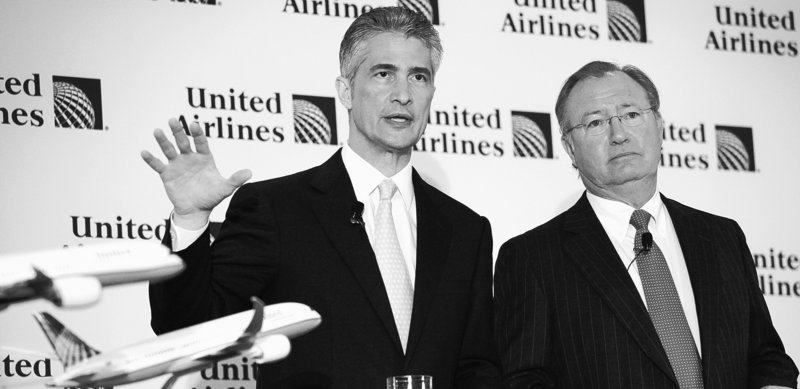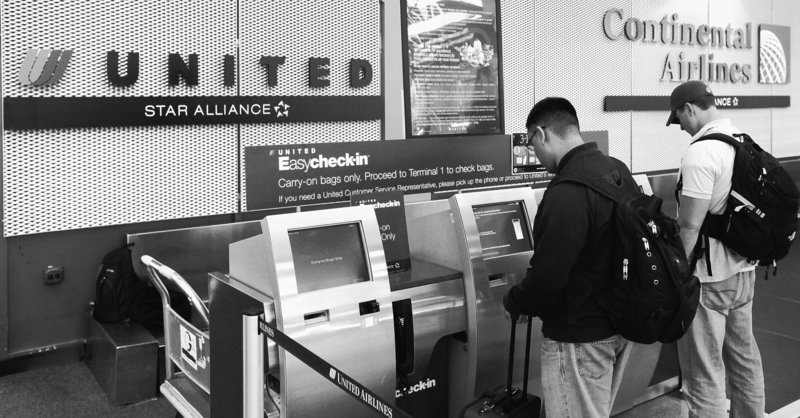United and Continental Airlines are counting on more business travelers — not higher fares for vacationers — to make their $3 billion merger pay.
United CEO Glenn Tilton and Continental CEO Jeffery Smisek announced Monday that the nation’s third- and fourth-largest airlines will consolidate into the world’s biggest in hopes of drawing more business travelers who will pay top dollar for last-minute tickets. It’s a stock swap deal in which United acquires Continental, and the new airline is to be called United.
The two airlines have been losing money, first from high fuel prices, then the recession. Now they say their combined network of flights across the U.S. and around the world will attract enough corporate travelers to boost revenue by up to $900 million a year.
“The only people happier than Jeff and I today is our corporate sales team,” Tilton said.
Henry Harteveldt, a travel-industry analyst for Forrester Research, said U.S. leisure fares probably won’t change much because Continental and United routes overlap heavily with low-fare carriers such as Southwest. They compete with discount carriers on 92 percent of the 50 biggest routes they serve, Harteveldt said.
Antitrust regulators will scrutinize the deal for its effect on fares, but Smisek and Tilton said even United won’t have be able to boost prices, because other carriers might undercut them.
“There is no carrier in the world that can set air fares,” Smisek said. “We couldn’t set air fares before this. We can’t set air fares after this.”
The deal would create a giant airline with major hubs in key domestic markets including New York, Los Angeles, Chicago, Houston and San Francisco and an international network that includes United’s extensive routes in the Pacific and Continental’s routes to Europe and Latin America.
The companies said 57 percent of their capacity would be domestic, with 20 percent across the Atlantic, 15 percent across the Pacific and 8 percent to Latin America.
Smisek said the carrier would not eliminate service to any cities, and said Cleveland would continue to be one of the hubs when the deal closes, even though it is near United’s hub in Chicago.
Officials for the two airlines said they will eliminate some headquarters jobs in Houston and Chicago, but they gave no numbers.
The deal will leave three big U.S. airlines with major international routes — the new United, Delta and American Airlines. United is the nation’s third-largest carrier by traffic, while Continental Airlines Inc., in Houston, is No. 4.
Smisek said United and Continental would seek shareholder votes in September, with the hope of closing the deal by the end of the year.
The companies say the deal is a merger of equals. United shareholders will hold a majority stake, and the airline will be based in United’s Chicago headquarters.
The new parent company will be called United Continental Holdings Inc., and have about $29 billion in annual revenue, based on 2009 results, and $7.4 billion in unrestricted cash. The airlines said combining would save them $1 billion to $1.2 billion a year by 2013, including between $800 million and $900 million in new yearly revenue.
They also said they expect costs of about $1.2 billion for expenses such as severance for laid-off workers and expenses from new labor deals.
Smisek and Tilton said they had briefed their unions on the deal.
Both companies said their boards had approved the transaction unanimously, which would include a labor representative on the UAL board.
The machinists’ union, which represents 16,000 workers at United and more than 10,000 at Continental, said it was concerned about the impact on pensions, benefits and job security.
The Association of Flight Attendants at United said it wants a contract before considering whether to support the deal.
The executives said they will work with the unions to reach new agreements, but said they don’t need union approval for the transaction to close.
Shares of both companies rose, with United parent UAL Corp. up 51 cents, or 2.4 percent, to close at $22.11, and Continental up 51 cents, or 2.3 percent, to close at $22.86.
Send questions/comments to the editors.




Success. Please wait for the page to reload. If the page does not reload within 5 seconds, please refresh the page.
Enter your email and password to access comments.
Hi, to comment on stories you must . This profile is in addition to your subscription and website login.
Already have a commenting profile? .
Invalid username/password.
Please check your email to confirm and complete your registration.
Only subscribers are eligible to post comments. Please subscribe or login first for digital access. Here’s why.
Use the form below to reset your password. When you've submitted your account email, we will send an email with a reset code.